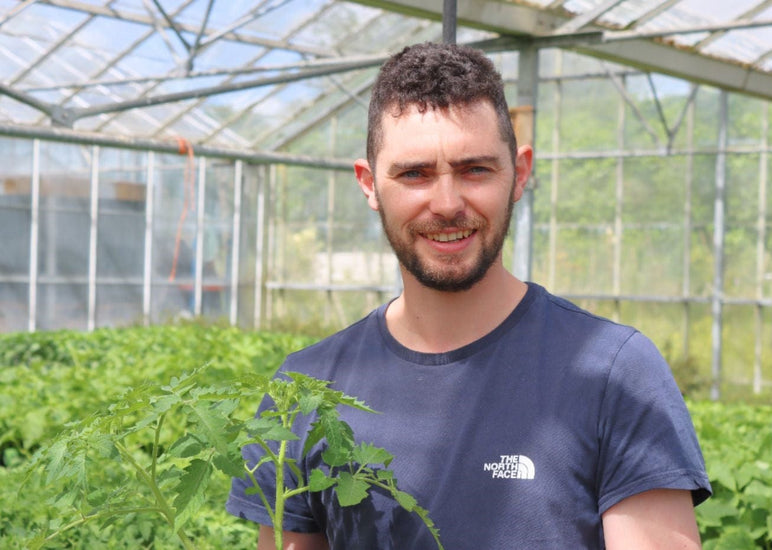Vegetable Plants
Turn food miles into metres by growing your own fresh veg. Think salads growing by the back door, not wilting at the bottom of the fridge. Herbs cut fresh from the kitchen windowsill. Fragrant tomatoes warm from the vine. Forget the will-they-won’t-they palaver of seeds. We’ll send you only the strongest young plants to get your patch off to a flying start. They’re all grown in the sunny South Downs and packed without plastic so that you can feel even better about what you eat.
Get started with our vegetable collections.
Sort and filter
South Downs National Park
Meet Josh
Slow grown veg from the sunny South Downs
Our vegetable plants are sown on a family farm in Lancashire, then nurtured into strong young plants by Josh in the sunny South Downs before they rock up in your garden. By selecting only the strongest and tastiest varieties, Josh makes sure you get a headstart on your plot, with impressive crops and no waste.
Vegetable Planting FAQs
What month is best to plant vegetables?
The majority of vegetables are sown in spring (March to May). Our recommendation is to plant veg after the last frost, which is usually at the beginning of June, but if you're interested in autumn and winter planting, we’ve got you covered!
How do you prepare the soil for a vegetable garden?
Soil preparation consists of three main steps: weeding, enriching the soil with organic or mineral matter and working or turning the soil. Get to know your soil a little better.
Where should I plant my vegetable garden?
Location is key and it’s all about finding a ‘sweet spot’ that gets at least 6 hours of direct sunlight a day. Ensure the area you choose has good drainage and easy access to a water source so you aren’t lugging your watering can around and getting more soaked than the veggies (we’ve all been there!). Many vegetables can also be grown in pots on a patio, balcony or in a garden. Easily pleased.
When should I fertilise my vegetables?
We would advise feeding early on in the growing season and remember to ‘keep calm and carry on’ when fruit begins to appear, as fertiliser is still needed at this stage to ensure continued growth.
Do I need companion plants?
A companion plant is planted near a vegetable plant to either discourage pests from attacking it (mint, chives, lavender), attract them away from it (nasturtiums, marigolds) or attract predators that eat pests (marigolds, fennel).
How often should a vegetable garden be watered?
The UK is renowned for its rainy days, but chances are rain alone won’t be enough and you’ll need to give your growing friends a helping hand. Make sure you’re giving your plants roughly 2-3 cm of water per week. Unsure if they need a drink? Stick your finger in the soil every day or two; if the top inch is dry, give them water.
Do I need a Greenhouse to grow vegetables?
No greenhouse? No problem. You can grow an array of vegetables from just a few pots on your patio or even in a small garden. Take a look at our favourite greenhouse alternatives.
I’m a beginner, what are some of the easiest vegetables to grow?
Lettuce, radishes and peas are your best friends. We also believe you’ll thoroughly enjoy the company of green beans, beetroots and carrots. Don’t just take our word for it, have a browse yourself.
How do I know when it’s time to harvest?
Follow the plant's lead. Typically, ripe vegetables are vibrantly coloured, tender, and easy to pull away from the plant. Remember: the rule that bigger is better doesn't always apply, especially in the garden.
Do I need to grow vegetables from seed?
There’s nothing quite like growing a plant from a tiny seed but you can also plant seedlings which can be easily planted either inside or outside. Seeds are planted in the ground whereas seedlings are already sprouted from seed before planting.
Can I grow vegetables in pots?
Absolutely! Growing your own vegetables doesn't require a large garden or an allotment - any sunny spot will do.





